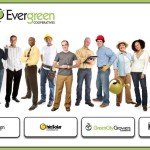 How a hospital, university, a hotel and a museum joined forces to seed economic opportunity for all.
How a hospital, university, a hotel and a museum joined forces to seed economic opportunity for all.
Ted Howard is the Co-Founder and President of The Democracy Collaborative, a national leader in community wealth building strategies and policy development and a founding member of the board of the Evergreen Cooperative Corporation. He also serves as the Minter Senior Fellow for Social Justice with The Cleveland Foundation. Ted has worked in the nonprofit/civil society sector for over 30 years, including more than 15 years in international development with NGOs and agencies of the UN system, serving as the Director of the National Center for Economic Alternatives, and serving on the board of directors of LIFT.
Food For Thought & Conversation
- Ted talks about the “rich ecosystem of cooperatives in this country” and enumerates several of them including credit unions, consumer and worker cooperatives. Please share your knowledge and /or experiences with similar cooperatives.
- Evergreen Cooperatives are a thriving example of the New Economy’s large scale worker owned cooperatives. The Cooperatives not only provide good livelihoods and benefits for worker owners, they also incubate additional cooperatives and invest in the community. A unique feature of Evergreen’s commercial laundry, energy solutions firm, and hydroponic greenhouse is their capture of the major purchasing power of the anchor institutions within that district like Cleveland Clinic, Case Western Reserve University, University Hospitals Case Medical Center and cultural arts institutions. Previously, these institutions were spending more than $3B annually for services and products provided from outside the community. Important to the launch of Evergreen Cooperatives were the Cleveland Community Foundation, the Mayor and City Council, the Democracy Collaborative and the commitment of the anchor institutions. Please discuss your thoughts and reactions to the Evergreen Cooperatives and their approach to the New Economy.
- 2017 update on Evergreen Cooperatives: Recently, a home ownership program was instituted. Foreclosed homes are bought and restored, then offered to the worker owners at very affordable rates. Worker owners voluntarily put 20% of the profits from the cooperatives into a nonprofit holding company to build new businesses so that others can benefit from the same opportunities. They also invest three percent of the profits in community initiatives and works. Substantial effort has been made to assure that facilities, operations, products and services enhance and do not harm the environment. The commercial laundry is in a Gold LEED certified facility and incorporates industry leading green innovations in its operations that service 10 million pounds of bed linens a year for anchor institutions. The energy solutions cooperative provides green energy to anchor institutions and residents. It has constructed a megawatt solar field, the largest in any low-income neighborhood in the United States. Green City Growers has a four-acre hydroponic greenhouse that produces three million heads of lettuce and 300,000 pounds of basil year round. Express your opinion about Evergreen Cooperatives and how they are doing.
- For more information on cooperatives and other initiatives that are addressing wealth inequality in the U.S., visit www.community-wealth.org.
Actions
- City governments have begun to help develop worker cooperative businesses in their local economies, a deliberate action to make economic development more inclusive and equitable. The Imagined Economy Project explores municipal approaches to worker co-op development in ten cities. Read the 2016 Report on efforts to develop projects in ten cities and discuss possibility of one of the approaches to increasing worker owned cooperatives in your city.
- . Invite friends, colleagues, community members or leaders to view this video with you and host a conversation.
Additional Information
- Another question that the Democracy Collaborative asks is “How do you address the growing inequality of wealth in the U.S.? “ The New Economy is an emerging movement that is taking place largely out of the limelight of conventional media. There is a groundswell of initiatives building an economy that takes care of people and the planet. Systemic changes range from how the economy’s wealth is measured to innovative business ownership designs and economic development approaches and partnerships. For more information visit the Democracy Collaborative or Next Systems Project Co-founded by Gar Alperovitz and James Gustave Speth.
[ultimate-recipe id=”7098″ template=”101″]
